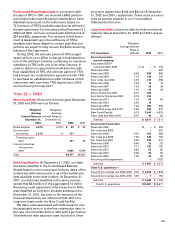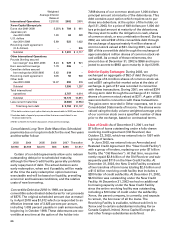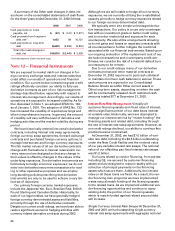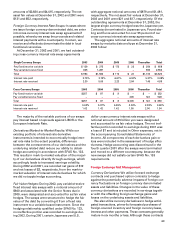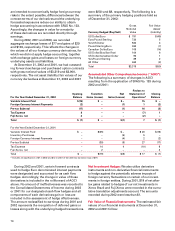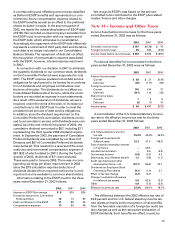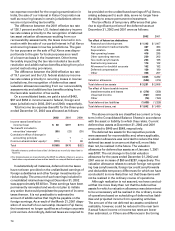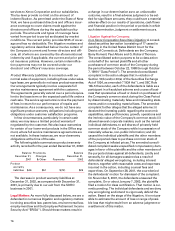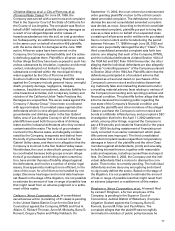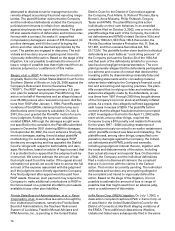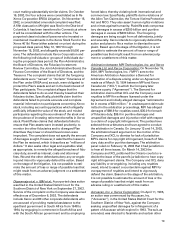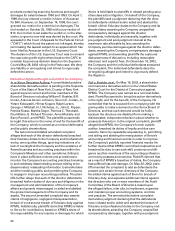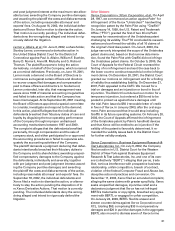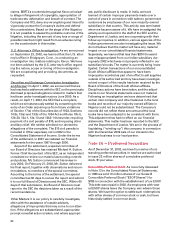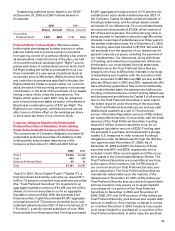Xerox 2002 Annual Report Download - page 77
Download and view the complete annual report
Please find page 77 of the 2002 Xerox annual report below. You can navigate through the pages in the report by either clicking on the pages listed below, or by using the keyword search tool below to find specific information within the annual report.
or amount of future reversals of existing taxable or
deductible temporary differences.
At December 31, 2002, we had tax credit carryforwards
of $204 available to offset future income taxes, of
which $159 is available to carryforward indefinitely
while the remaining $45 will begin to expire, if not uti-
lized, in 2004. We also had net operating loss carryfor-
wards for income tax purposes of $262 that will expire
in 2003 through 2012, if not utilized, and $1.9 billion
available to offset future taxable income indefinitely.
At December 31, 2002, our Brazilian operations had
assessments for indirect and other taxes which, inclu-
sive of interest, were approximately $260. These
assessments related principally to the internal transfer
of inventory. We do not agree with these assessments
and intend to vigorously defend our position. We, as
supported by the opinion of legal counsel, do not
believe that the ultimate resolution of these assessments
will materially impact our results of operations, finan-
cial position or cash flows.
We are subject to ongoing tax examinations and
assessments in various jurisdictions. Accordingly, we
provide for additional tax expense based upon the
probable outcomes of such matters. In addition, when
applicable, we adjust the previously recorded tax
expense to reflect examination results.
From 1995 through 1998, we incurred capital losses
from the disposition of our insurance group operations.
Such losses were disallowed under the tax law existing
at the time of the respective dispositions. As a result of
IRS regulations issued in 2002, some portion of the
losses may now be claimed subject to certain limitations.
We have filed amended tax returns for 1995 through
1998 reporting $1.2 billion of additional capital losses.
As of December 31, 2002, we have $425 of capital gains
available to be offset by the capital losses during the
relevant periods and anticipate a potential tax benefit
of approximately $150 to be recognized in a future
period. The additional losses claimed and related
tax benefits are subject to formal review by the U.S.
government which is currently in process. We have not
recognized any tax benefit of these losses pending the
completion of this review. Any resulting capital loss
carryforwards will expire, if not utilized, by 2003.
Note 15 — Litigation, Regulatory
Matters and Other Contingencies
Guarantees, Indemnifications and Warranty Liabilities:
As more fully discussed in Note 1, we apply the
disclosure provisions of FIN 45 to our agreements that
contain guarantee or indemnification clauses. These
disclosure provisions expand those required by SFAS
No. 5 “Accounting for Contingencies,” by requiring
that guarantors disclose certain types of guarantees,
even if the likelihood of requiring the guarantor’s per-
formance is remote. As of December 31, 2002, we have
accrued our estimate of liability incurred under these
indemnification arrangements and guarantees. The
following is a description of arrangements in which we
are a guarantor.
Indemnifications provided as part of sales and purchas-
es of businesses and real estate assets: We are a party
to a variety of agreements pursuant to which we may
be obligated to indemnify the other party with respect
to certain matters. Typically, these obligations arise in
the context of contracts that we entered into for the
sale or purchase of businesses or real estate assets,
under which we customarily agree to hold the other
party harmless against losses arising from a breach of
representations and covenants. These relate to such
matters as adequate title to assets sold, intellectual
property rights, specified environmental matters, and
certain income taxes. In each of these circumstances,
our payment is conditioned on the other party making
a claim pursuant to the procedures specified in the par-
ticular contract, which procedures typically allow us to
challenge the other party’s claims. Further, our obliga-
tions under these agreements may be limited in terms
of time and/or amount, and in some instances, we may
have recourse against third parties for certain
payments we made.
Patent indemnifications: In most sales transactions to
resellers of our products, we indemnify against possible
claims of patent infringement caused by our products
or solutions. These indemnifications usually do not
include limits on the claims, provided the claim is
made pursuant to the procedures required in the sales
contract.
For the indemnification agreements discussed
above, it is not possible to predict the maximum poten-
tial amount of future payments under these or similar
agreements due to the conditional nature of our obliga-
tions and the unique facts and circumstances involved
in each agreement. Historically, payments we have
made under these agreements did not have a material
effect on our business, financial condition or results
of operations.
Residual value guarantees: For certain vendor-financing
relationships, we have guaranteed the leasing company
for the residual value position they have taken subject
to the lease. The amount of these guarantees are
insignificant at December 31, 2002, but may be material
in future periods to the extent we offer additional
guarantees.
Indemnification of Officers and Directors: Our
corporate by-laws require that, except to the extent
expressly prohibited by law, we must indemnify our
officers and directors against judgments, fines, pen-
alties and amounts paid in settlement, including legal
fees and all appeals, incurred in connection with civil
or criminal action or proceedings, as it relates to their
75


